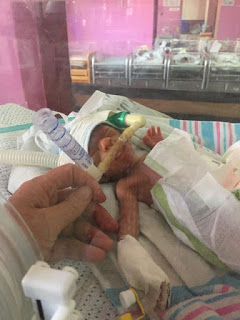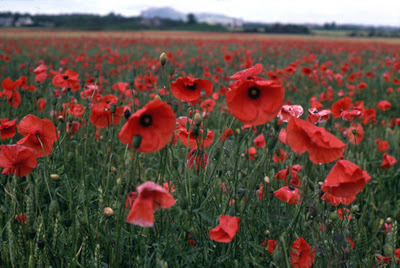God is forever knocking people like us off balance, new languages and countries, new homes and rules. When we came to Naivasha's public hospital after a Swahili refresher course in mid-2016, we lived in a dorm-room like very basic hostel for over a month waiting for our rental house to be available, had a major break-in where thieves stole our computers and cameras, besides the fact that we started work during the first of many doctor strikes. The last two years have been a-surprise-a-week, with constant changes in staffing, funding, medicine availability, colleague movement, etc. Now our "MOU" with the hospital has expired, and our Serge commitments mean spending the first part of 2019 based out of Uganda, largely to supervise the never-straightforward path of Christ School during the Dickenson's Home Assignment, before the arrival of the McClure's. Yes, in many ways going to Bundibugyo for a few months is going home, and our core job of being Serge Area Directors does not alter. We will actually spend some of that time visiting teams easier to access from Uganda, in DRC and Burundi. Still.
Change.
It's on the horizon again, and it's already feeling unsettling.
 In two years of being outsiders, trying to fit as missionaries into the Kenyan government system, as educators into a place where university strikes have delayed internship dates, as consultants into a place where people were used to less supervision, a few things about our Naivasha life have given us stability. We love our simple stone-floored cottage, biking distance to work. We love our evening walks and morning runs, our cheery mongrel dog, our community of friends through church and neighbors and history. We love the spark that comes from empowering others. We love the quiet spaces of living as a couple, that enable us to regroup the energy for our very cross-cultural work and our very far-flung people-filled Serge Area. We love our proximity to several Kenya teams, and to nature reserves for camping.
In two years of being outsiders, trying to fit as missionaries into the Kenyan government system, as educators into a place where university strikes have delayed internship dates, as consultants into a place where people were used to less supervision, a few things about our Naivasha life have given us stability. We love our simple stone-floored cottage, biking distance to work. We love our evening walks and morning runs, our cheery mongrel dog, our community of friends through church and neighbors and history. We love the spark that comes from empowering others. We love the quiet spaces of living as a couple, that enable us to regroup the energy for our very cross-cultural work and our very far-flung people-filled Serge Area. We love our proximity to several Kenya teams, and to nature reserves for camping.
Already the impact of stepping away from routines for a season starts to feel sorrowful, unmoored.
And yet, this is exactly the life we have been calling OTHER people into. Transition, instability, where-did-I-put-that, how-do-you-say-this, why-is-it-like-that kind of days. A new family is on the way to Kijabe, having sold their two-doc house and left their richly-meaningful-extended-family-full life, and as I prayed for them this morning I could FEEL the drain of all that motion. A couple in their 20's and a woman about to graduate from college will be at our December Assessment and Orientation, seeking to join teams in Litein and Kibuye, huge steps into the unknown. We have families raising support, others traveling back for the holidays to support limited prognosis kinds of parental diagnoses. Like us, most of them will wobble on through the grey zone from old-normal to new-normal. Some of us will have to do it again, and again.
Normal is not bad, it is the background rhythm of life that lets you make breakfast knowing the groceries and fuel/power are there, lets you make phone calls knowing the numbers are in your phone, lets you focus on relationships and spiritual formation and work tasks, because you aren't drained by wondering how to get drinking water.
But God seems to frequently strip away the normal. On my good days, I can embrace a pattern to this painful process, a method to the chaos. Back in August, Greg Thompson told us that the wilderness was not just a place of emptiness, of stripping away. It was a place of embrace. That when we are made uncomfortable as our props are knocked out, God is inviting us to realize that He alone is enough.
Most days that truth remains obscured by an uneasy sense of fragility. It takes faith to want God more than a space that works, a community that knows, a job that flows. Pray for us as we approach a season of transition. Pray for our Sergers who live in this state of imbalance. Pray we would all choose the opportunity for embrace over the soul-stunting of comfort.
Change.
It's on the horizon again, and it's already feeling unsettling.
 In two years of being outsiders, trying to fit as missionaries into the Kenyan government system, as educators into a place where university strikes have delayed internship dates, as consultants into a place where people were used to less supervision, a few things about our Naivasha life have given us stability. We love our simple stone-floored cottage, biking distance to work. We love our evening walks and morning runs, our cheery mongrel dog, our community of friends through church and neighbors and history. We love the spark that comes from empowering others. We love the quiet spaces of living as a couple, that enable us to regroup the energy for our very cross-cultural work and our very far-flung people-filled Serge Area. We love our proximity to several Kenya teams, and to nature reserves for camping.
In two years of being outsiders, trying to fit as missionaries into the Kenyan government system, as educators into a place where university strikes have delayed internship dates, as consultants into a place where people were used to less supervision, a few things about our Naivasha life have given us stability. We love our simple stone-floored cottage, biking distance to work. We love our evening walks and morning runs, our cheery mongrel dog, our community of friends through church and neighbors and history. We love the spark that comes from empowering others. We love the quiet spaces of living as a couple, that enable us to regroup the energy for our very cross-cultural work and our very far-flung people-filled Serge Area. We love our proximity to several Kenya teams, and to nature reserves for camping.Already the impact of stepping away from routines for a season starts to feel sorrowful, unmoored.
And yet, this is exactly the life we have been calling OTHER people into. Transition, instability, where-did-I-put-that, how-do-you-say-this, why-is-it-like-that kind of days. A new family is on the way to Kijabe, having sold their two-doc house and left their richly-meaningful-extended-family-full life, and as I prayed for them this morning I could FEEL the drain of all that motion. A couple in their 20's and a woman about to graduate from college will be at our December Assessment and Orientation, seeking to join teams in Litein and Kibuye, huge steps into the unknown. We have families raising support, others traveling back for the holidays to support limited prognosis kinds of parental diagnoses. Like us, most of them will wobble on through the grey zone from old-normal to new-normal. Some of us will have to do it again, and again.
Normal is not bad, it is the background rhythm of life that lets you make breakfast knowing the groceries and fuel/power are there, lets you make phone calls knowing the numbers are in your phone, lets you focus on relationships and spiritual formation and work tasks, because you aren't drained by wondering how to get drinking water.
But God seems to frequently strip away the normal. On my good days, I can embrace a pattern to this painful process, a method to the chaos. Back in August, Greg Thompson told us that the wilderness was not just a place of emptiness, of stripping away. It was a place of embrace. That when we are made uncomfortable as our props are knocked out, God is inviting us to realize that He alone is enough.
Most days that truth remains obscured by an uneasy sense of fragility. It takes faith to want God more than a space that works, a community that knows, a job that flows. Pray for us as we approach a season of transition. Pray for our Sergers who live in this state of imbalance. Pray we would all choose the opportunity for embrace over the soul-stunting of comfort.
Happy moment with our neighbor-kids for dinner
The second set of triplet survivors in the last couple months, almost ready for discharge. No small miracle. Also this week, not pictured, a baby went from 820g (1 lb 12 oz) to 1900g (4 pounds) in her nearly 8-week hospitalization (she had been born 11 weeks early).
Scott teaching midwives about breech delivery techniques today











































